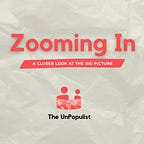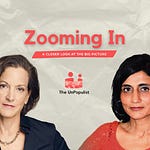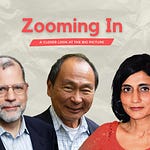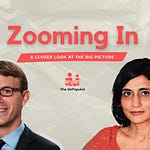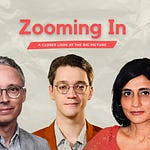Listen to Zooming In at The UnPopulist in your favorite podcast app: Apple Podcasts | Spotify | Google Podcasts | RSS
Aaron Ross Powell: Welcome to Zooming In, a project of The UnPopulist. I'm Aaron Ross Powell. Academic freedom is under assault, but who is mounting that assault depends on who you ask. The right has long argued that universities are controlled by the left with free inquiry as the victim. The liberal right, it turns out, doesn't much care for liberal education. The result is a wave of right-populist assaults on the very academic freedom they've historically claimed to support. To explore these issues, I'm joined by Jonathan Marks. He's a professor of politics at Ursinus College and author of Let's Be Reasonable: A Conservative Case for Liberal Education.
A transcript of today’s podcast appears below. It has been lightly edited for flow and clarity.
Aaron Ross Powell: The right has long claimed that leftist control of our universities results not just in indoctrination, but in a climate that pushes back on the free inquiry that is central to the university project, that the left opposes free speech and doesn't want professors to explore ideas that it doesn't like. At the same time, though, we have seen an increasing turn on the right against academic freedom. The most recent and prominent example is probably the New College of Florida, where the right has taken over the college board and is instituting a narrow conception of what a university ought to be and the kinds of ideas it ought to explore.
Yet many on the right seem far less concerned suddenly about academic freedom when it's their guys limiting it or when its limitations are being used to promote right-wing causes. Why is there that disconnect? Why do we see people on the right much more concerned about assaults on academic freedom when they come from the left, but then suddenly becoming very quiet when it is the right and conservatives apparently doing it?
Jonathan Marks: I have a couple of ideas about that, and maybe just a little bit of background about the New College situation, that began in January 2023, so that's just this year, when Ron DeSantis appointed six new trustees, which together with some others already appointed to constitute a majority of the New College board. They are, with the support of the state legislature, busy attempting, in the words of the Lieutenant Governor of Florida, to “transform” New College, which is a small public honors college, more or less, into the “Hillsdale of the South,” meaning to transform it into a conservative college. Certainly, although Hillsdale also happens to be a religious college, that doesn't seem to be part of it. Directly speaking, it's an interesting language to use.
In the course of that, they appointed a new president, they've at least put into the future, various folks who had cleared every other hurdle to tenure, all with a view to putting their stamp on the college. That's a violation of academic freedom for a number of reasons, but one of the reasons has to do with the principle of shared governance, whereby trustees show a certain restraint, even with respect to or especially with respect to matters of the curriculum, where faculty are thought to have the expertise and the purview to make most of the determinations about what's going to taught.
What explains support for these actions among people who have been screaming and complaining about academic freedom and free speech on campus for many years? I think there are two answers to that question. The first one is despair. That is the sense that free speech really can't be preserved on universities by traditional means. Colleges will not transform themselves, they're too dominated by left progressives. The only thing you can do is try to place enormous pressure on them to reform.
Some folks who favor free speech and academic freedom may not even love what's going on in New College, but they consider it a great warning signal that will maybe spur some colleges and universities to reform themselves, by caring more about free speech, intellectual diversity, that kind of thing. There's a second issue, which I think is important, which is that there are some folks behind this reform, like Chris Rufo, who's one of the trustees at New College who have said quite openly that they're not in favor of academic freedom. They are motivated by what I'd call spirit of “illiberal populism.”
They think that ostensibly, neutral-sounding things like academic freedom where it sounds like every idea it's going to have its day, or freedom of speech where it sounds like every idea is going to have its day, or even free markets where it sounds like everybody gets to do what they want, the argument is a Trojan Horse in a way for the dominance of a left progressive elite. You can't honor academic freedom, you have to crush the left progressives in the university, you have to crush the left progressives over at Disney, you have to crush the left progressives in the civil service and so on.
“They [rightwingers] think that ostensibly, neutral-sounding things like academic freedom where it sounds like every idea it's going to have its day, or freedom of speech where it sounds like every idea is going to have its day, or even free markets where it sounds like everybody gets to do what they want, the argument is a Trojan Horse in a way for the dominance of a left progressive elite. You can't honor academic freedom, you have to crush the left progressives.”
Aaron: I think there's a lot of very interesting ways we can carve those attitudes at the joints to try to get at what's going on and why we should be concerned about it, because on the one hand, just the idea that there's a small university that is used to be fairly progressive in its academic outlook and is now being shifted.
There are plenty of conservative universities out there. You mentioned Hillsdale, but there are also more evangelical religious ones. There's Bob Jones University and Liberty University, and there are universities that just have more of a conservative bent. That's not necessarily troubling to us. Is there anything wrong with saying “our university is going to advance a particular perspective?”
Jonathan: Certainly, there's nothing wrong with it vis-à-vis our laws, but there's a long tradition to which academic freedom is connected, whereby universities ought not to be founded to advance particular agenda. If you look at the early history of academic freedom in 1915 when the American Association of University Professors (AAUP) issues a statement that came in a lot of ways to define academic freedom with adjustments down to the present day, they said that you've got proprietary institutions. Those institutions are looking to advance particular vision. Could be religious, might not be religious. We're looking to advance some set of values of some kind.
Then there's the new research university, and they're devoted to inquiry into matters of human concern. They really want to distinguish themselves from those proprietary institutions. In their view, those proprietary institutions can continue to exist. Nothing wrong with that, but the claim of the university for public support rests on the role it plays in the advancement of inquiry and knowledge, which is in some ways at odds with the notion that what we're about is promoting some vision of social justice or another.
Aaron: When we're talking about free inquiry and advancing knowledge, though, so newspapers have a split between editorial and their news reporting side, and there's a recognized—the journalists are doing something fundamentally different than the columnists are. At the university, as far as what kinds of inquiry we ought to protect or ought to see as constitutive of this flourishing academic freedom, it seems like, could there be a difference between these, say, hard science researchers are exploring every question no matter where it might lead, which might be different from the professor who is using their position and their research to engage in say, very direct political action or persuasion.
We might want them to access their ideas freely, but I can imagine someone saying that's a different thing. It's a different thing from the sociologist trying to figure out why gun violence happens versus the sociologist who is spending his or her classroom hours telling the students that they should go out and advocate for gun control.
Jonathan: A couple of things to that. Every answer is a couple of things. The first thing is to say that there is a wing of the university that really has its origin in the 1960s. These are programs and things like ethnic studies, African American studies, Chicano studies, that kind of thing. Those disciplines or really, interdisciplinary programs, understood themselves really quite self-consciously as looking to enact some political objectives. In so doing, I think they did think of themselves as changing the character of the university.
That's a problem. Let me explain why it's a problem. I said that our claim to academic freedom as professors, and I'm a professor, has historically rested on the idea that we are, as you say, pursuing inquiry, arguments, and evidence where they lead rather than trying to advance a partisan agenda. How can we say states or trustees don't intervene if we ourselves are pursuing a partisan agenda? What's our justification for asking not to intervene? I think a trustee or a state might quite sensibly say to themselves, something to the effect of, "Well, if there's going to be a political agenda at the university, may as well be mine, right?"
Now that doesn't mean that you can't pursue interested lines of inquiry. For example, you don't even have to go outside the realm of scientific research. I might be really attached to some ideas about how to cure cancer. I may have gone into academics not to inquire into the truth, but because I want to change the world by curing cancer. You can imagine the economist entering into study for similar reasons. They want to change the world in some manner or another and they think that economics is a useful tool.
I think that, at least on a traditional understanding of academic freedom, all one asks is that those researchers pursue that line in a certain matter, such that they enter into a community of inquiry with certain standards, sometimes broad, sometimes within their specific discipline. And when the evidence contradicts their cherished views, they honor the evidence rather than their cherished views.
“On a traditional understanding of academic freedom, all one asks is that those researchers pursue that line in a certain matter, such that they enter into a community of inquiry with certain standards, sometimes broad, sometimes within their specific discipline. And when the evidence contradicts their cherished views, they honor the evidence rather than their cherished views.”
There's nothing wrong, I don't think, in going into academics with something other than a motive to eat at the “tree of pure theory” or something like that. Nonetheless, and I keep saying traditional understanding of academic freedom, but I think that understanding, again, makes sense with respect to fending off intervention in the universities. That's the understanding of how to pursue something that you really cherish in a manner that's consistent with the way in which we justify academic freedom and justify the genuinely very special privileges that academics have.
Aaron: This seems like part of the challenge then is that one way to look at the critique from both the left of academic activities and the critique from the right in terms of viewing academic activity as indoctrination and the left trying to control the commanding heights of culture and education and so on, is that both of them, to some extent, are rejecting the possibility of what you just described, in the sense that what they are saying is every method of inquiry, every area of inquiry brings with it either a desire for certain normative outcomes or has baked in certain normative assumptions that are then themselves political.
The right is saying, "Look, it's not—" This is I think why you don't see them say, "Look, we don't like what the CRT people are teaching. Therefore, the solution is to have courses on other ways of looking at race." Rather, they say like, "We need to stop the teaching of CRT just because the very fact of teaching it or of teaching just America's racial history is itself a politicized act that is selling a certain progressive worldview."
The left says, "Look, the sciences that you just described have all of these internalized, normative assumptions that are political about what counts as evidence, what counts as proper kinds of inquiry, what counts as the kinds of questions one should be—or are worthy of exploration and so on." To some extent, it seems like what you're saying is we should—that's not true, and that instead, there is a non-political way to approach the pursuit of knowledge in this intellectually honest way that you have described. Is that a fair representation of distinguishing the sides versus your position?
Jonathan: Yes. It used to be, I think, a pretty common position on the left. I've been in higher education for about 25 years and it used to be pretty common when you said, "I really think that we ought to be looking at the arguments and the evidence rather than coming in with our pre-date ideological agenda," for somebody on the left or the influence the left to say, "Well, everything is political." Almost wearily, everybody knows that “everything is political.” Under the guise of neutral academic standards, in fact, the universities are in the control of the capitalists and the Zionists and all that kind of thing.
I guess there's always been something of that on the right too, but I think that at least in terms of it being a popular way of talking about higher education, even among right-wing academics, that seems at least relatively new with respect to the time I've been involved. They say, "Well, no, obviously, universities aren't controlled by the Zionists and the capitalists, they're controlled by the progressive elite, and everything is political." Both sides say that standards, purportedly neutral, are instruments of power.
Now, why might the right be saying that now? I think part of the reason is that they hit upon the strategy in red states of noticing that boards of trustees have almost unlimited power if they choose not to observe the norms that have for a long time governed the way in which we manage higher education institutions. It's an academic freedom version of “Free speech for me, but not for thee.”
On the left, they feel like they've got controls within the institutions. They dismiss concerns about neutrality and free speech because they've got the power to work their will. To exaggerate, and I'll take back part of that exaggeration, and it's on the outside, in red states and they hope soon at the federal level as well. Conservatives think, "Well, we've got the power, and so we don't have to respect these norms." You're inclined to appeal to the norms loudly and desperately when you don't have power. When you do have power—"What norms?”
“Conservatives think, ‘Well, we've got the power, and so we don't have to respect these norms.’ You're inclined to appeal to the norms loudly and desperately when you don't have power. When you do have power—’what norms?’”
Now, there is an intellectually serious argument, of course, and that's where I take part of this back, that says, "Well, there is no point outside of our subjectivity where you can occupy and look down on things and say, "Well, I've got the object of truth of the matter." I think that's right, but at the same time, that point doesn't really mean—none of these players really think it means in other contexts that you can't distinguish between partisan and more or less nonpartisan interventions in research.
In a lot of ways, academic practices are not designed to end subjectivity, which is impossible, but to enable us to get at or move in the direction of confidently thinking we've got a truth, we can communicate with others who, operating under the same standard, are willing to acknowledge it. These are ways of trying to—despite our subjectivity—make our way in the world.
“Academic practices are not designed to end subjectivity, which is impossible, but to enable us to get at or move in the direction of confidently thinking we've got a truth, we can communicate with others who operating under the same standard are willing to acknowledge it. These are ways of trying to—despite our subjectivity—make our way in the world.”
In real life, outside of a context in which people are trying to make a theoretical or a highly politically useful point, I don't know anybody who really thinks that there's no way of distinguishing between looking at the world through a really partisan lens and looking at the world through a lens that accounts for some of the fallacies that we're prone to fall into because of our prejudices.
Aaron: Early discussions of what now we call “cancel culture” and the worries about free speech, at least in this latest iteration, I'm old enough to remember the 1990s, they arose in the university context. The early stories were about students protesting speakers and so on, and universities have stayed at the center of this conversation about free speech and free inquiry and worries about this degradation and on through to the conversation we're having now.
I guess the question I want to ask is, why universities? Why are universities so much at the center of these fights about politics and indoctrination given that several years ago, I decided to look at the research and it turns out that as wonderful as professors are, they don't have that much of an impact on their students' political views.
At colleges—universities, as a general rule, don't tend to change their students' views much. What change you see tends to be more peer effects that you move out of your small rural red town, you go to a university town or a more cosmopolitan urban place, people tend to be more left, your friends tend to be more left, you adjust your views, but it's not sticky. When you leave, they tend to drift back to what they were before.
It's like, all of this is about something that doesn't actually seem to have as much effect as people think it does. The conservative is not going to win back American culture by taking over universities. The left is not dragging us into communism because there's a lot of left-wing professors. What is it about universities that makes them such a flashpoint for fights over basically who gets to control the direction of discourse and culture?
Jonathan: First of all, I've seen some of that research as well. I think that we really don't know that much about the effect college has on students with respect to what they think. It's not that easy to distinguish between peer effects and effects in the classroom or effects due to the broader atmosphere at colleges and university. There's no question that both the left and the right, whatever the merit to that research, think that universities are a way, just as you say, of exerting some control over the discourse of what kinds of things people talk about, of what kinds of things get published.
“We really don't know that much about the effect college has on students with respect to what they think. It's not that easy to distinguish between peer effects and effects in the classroom or effects due to the broader atmosphere at colleges and university. There's no question that both the left and the right, whatever the merit to that research, think that universities are a way, just as you say, of exerting some control over the discourse.”
Way back, long before the '90s, in 1962, there was this document issued by Students for a Democratic Society, which came to be known as the Port Huron Statement, in which they say quite explicitly, what we really need to do is to ally ourselves with left-wing actors outside of the university and the labor movement and elsewhere and transform universities into bases for an assault on the loci of power, something like that. Parts of the left have seen universities in that way.
More recently, I was reading a scholar who's involved in the Boycott, Divestment and Sanctions (BDS) movement concerning Israel. She argues that the movement to boycott Israel within universities is part of a broader movement to transform universities into sites of struggle against US imperialism and the imperialism of smaller cousins like Israel. I agree with you that hasn’t been terribly effective. I've written a lot about that.
If that were true, if that had been terribly effective, hotel management majors wouldn't outnumber those who show any interest in politics or humanities subjects on campus. Clearly, there are limits to how far that kind of thing goes. I think on the right, the interest of the universities, in part the perception, which I think is largely correct, that universities on average are left progressive in bent, and they do occupy, like the media, like arts institutions, they occupy a certain place in the culture. I also think that people are misled about the extent to which there's indoctrination going on at colleges and universities. That's a very powerful talking point. That could get a lot of people quite interested in that.
There's a big industry going on for some time now among conservative journals, which will just pitch five stories into a Twitter feed per day about the depredations of college administrations and college students and so on and so forth. I could do the same thing with respect to medical malpractice lawsuits and make you very afraid to enter a hospital and make you think that it's essential that we take over hospitals and reform them. I think there is also a misperception out there.
“There's a big industry going on for some time now among conservative journals, which will just pitch five stories into a Twitter feed per day about the depredations of college administrations and college students and so on and so forth. I could do the same thing with respect to medical malpractice lawsuits and make you very afraid to enter a hospital and make you think that it's essential that we take over hospitals and reform them.”
I would say that despite what you say about the research showing, I think what it mostly shows is that peers at colleges are more important in the way in which students move than faculty members are, and that tracks with my own experience. Nobody listens to me, so I get that. Despite that, at the very least, one could argue that there's a missed opportunity there.
Let's say that the overwhelming majority of faculty are left-progressive and that they vastly outnumber conservatives, which is true nationally. We do know this based on self-reported data, big studies from the Higher Education Research Institute. Well, your ideological bent, despite all of our training and all of our efforts, our ideological bent affects what questions we think it's important to look into, what studies we're going to view with great skepticism, and which ones we're just going to add to our arsenal, which students we find irritating, which ones we view as heroes and so on.
I said before, there's some truth to the notion that we are subjective. Professors are subjective too despite their training, and so when you look at an institution that not only is dominated, again, faculty-wise, and also student-facing administrator-wise by left progressive, you should start to notice, well, they're telling everybody else to look into their prejudices, but they don't seem particularly to care about their own. When confronted with the idea that there aren't that many conservatives at universities, are inclined to say, “Well, that's because conservatives are stupid money grubbers, so of course, they don't feel at home at universities.”
“Professors are subjective too despite their training, and so when you look at an institution that not only is dominated, again, faculty-wise, and also student-facing administrator-wise by left progressive, you should start to notice, well, they're telling everybody else to look into their prejudices, but they don't seem particularly to care about their own.”
Aaron: Yes, I think that's an important point. There's a professor that I know who came from a working-class British background, like fairly poor, and she's very, very progressive. I think she describes herself as a socialist but complains frequently about how her colleagues are really obsessed with notions of privilege when it comes to gender and race and ethnicity, but they just have no idea about the privilege that comes from—most of her colleagues came from well-to-do, highly educated backgrounds and are not interested in the working class as like a category that they should extend concern to, not because they don't feel it, but they don't know it because so few professors came from a really impoverished working-class background.
Jonathan: Yes. There is that subjective consideration too. Richard Rorty wrote a book probably a couple of decades ago now. Richard Rorty, both a known engaged person of the left and also a well-known philosopher, and he argued that there had been a real change in the character of the left which was most evident at universities but not limited to universities. He called that left the “cultural left” to distinguish it from a left that was more concerned with class and economics.
As you say, you can get that critique of universities from left-liberals too, except they'll say, "Well, parts of the university are too dominated by this piece of the left, and I prefer they be dominated by this other piece of the left."
Aaron: If you care about not just academic freedom, but the proper academic inquiry which depends upon academic freedom, and we want to encourage that, what do we do in the current environment? Because we seem to be in a situation where the left does have overwhelming control. The surveys of how many people in a given department are registered Democrats versus independents versus Republicans—depending on the department, there can be basically zero Republicans, and everyone is Democrats and so on. It is overwhelmingly left.
The right is increasingly turning against, as you described, academic freedom in an attempt to take over and move things, not towards free inquiry, but just in an unfree inquiry way that's producing the kinds of stuff that they like. How do we start to fix that? Because you're asking sides to give up their arms to some extent. Well, the other guys seem to be arming up as much as they can.
Jonathan: Yes. The short answer is, I sure don't know, but I'll give you a couple of ideas. One is, I think it really is partly a fight among conservatives. There are in a way two fights, one's inside the university and one's outside the university. University reform nowadays, as I said at the top of this, seems to be motivated by illiberal populism. The argument is something to the effect of, "Well, these ostensibly neutral institutions are dominated by a sick-minded elite and, by God, we're paying for it. Waitresses and truck drivers shouldn't have to subsidize people who hate them."
This is pretty straightforward populism and it worships at the altar of Viktor Orbán in Hungary who was quite explicit in thinking that we need to move toward illiberal democracy. Historically, of course, there has been a healthy chunk of the right that thought that what conservatives need to preserve was precisely liberalism. Part of it now is trying to defeat the illiberal right. Conservatives can’t do it alone but they can be part of it.
Then within the universities, on the other hand, I think that—I think this really goes on from campus to campus. It's not some big nationwide thing that can happen, but from classroom to department to college to become the model for other colleges and so on. Colleges need to concede. As I think you can find, again, a lot of non-conservatives conceding that conservatives have a legitimate gripe with colleges and universities.
And while it shouldn't be remedied by allowing conservatives to take over some of them or something like that, colleges, and universities need to show in different ways, as to some extent that they do already. In other words, a lot of the university still very much consist of the disinterested pursuit of knowledge. Just because a lot of faculty members are liberals doesn't mean that they'll never tell you about the existence of Adam Smith or Friedrich Hayek or people like that. They need to demonstrate in a variety of ways that they take this problem seriously as, by and large, they haven't been, it seems to me.
In a way, it's quite convenient to have an illiberal populist assault in the university because then you can stave off any kind of criticism by saying, "Well, that's the illiberal right who's saying that." Even if there were a glimmer of truth, you wouldn't want to encourage the illiberal right. I think that inside the university, people who are devoted to academic freedom, which I think is most faculty members, most faculty members need to actually find their voices where issues arise that can really attract justified criticism.
For example, should we as a job requirement have candidates write essays about what anti-racism is and how they've demonstrated being anti-racist in their lives? I think faculty dedicated to academic freedom need to raise questions about that kind of thing. They need to raise questions about intellectual diversity on campus. They need to be more engaged than, I think, faculty traditionally are in this kind of thing.
“Should we as a job requirement have candidates write essays about what anti-racism is and how they've demonstrated being anti-racist in their lives? I think faculty dedicated to academic freedom need to raise questions about that kind of thing. They need to raise questions about intellectual diversity on campus. They need to be more engaged than, I think, faculty traditionally are.”
Most of us didn't go into academics to be engaged in a battle to save universities. We want to go study something in our lab. It takes a certain amount of energy to notice that there is a problem and then actually confront some really spirited people who are actually in academics for the activism. Those who know each other, are better organized and so on, it takes a kind of courage and maybe even more than courage. It takes a lot of retail politics and legwork, which faculty members often aren't inclined to do.
In a way, I think the reason that the left has so much influence at colleges, universities, and some neighborhoods—not in all—is that in a way, they wear the other side out. It's not that folks necessarily agree with, let's call them the “far left,” of the university who probably represent maybe 12% of faculty nationwide. They can have an outside influence because this is mostly what they wish to do and other people get tired in a way of fighting against them and figure, "Well, this isn't affecting what's going on in my lab, so that's okay," but multiplied over a lot of instances, that can discredit universities.
It's not that conservatives wouldn't attack universities if universities were pristine places where research was pursued, they still would. But how much purchase of that attack has something to do with what's really going on at colleges and universities.
Aaron: Thank you for listening to Zooming In at The UnPopulist. If you enjoy the show, please take a moment to rate and review it on Apple podcast and also check out our sister podcast, ReImagining Liberty, where I explore the radical emancipatory potential of liberty. You can also join our Discord listener community and book club by following the link in the show notes. Zooming is a project for The UnPopulist and is produced by Landry Ayres.
The UnPopulist invites interesting thinkers from across the political spectrum to foster a wide-ranging and thoughtful conversation to advance liberal values, including thinkers it may—or may not—agree with.
© The UnPopulist 2023
Follow The UnPopulist on Twitter (@UnPopulistMag) and Facebook.


